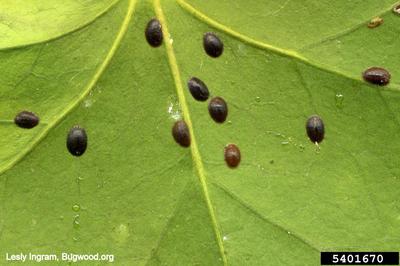Brown Soft Scale
Coccus hesperidum
Insect
In a Nutshell
- Brown soft scales feed on stems, leaves, green twigs and occasionally on fruits.
- The feeding damage shows as leaf yellowing and, in severe cases, even defoliation.
- Indirect damage by sooty mold is far greater than direct damage by the scales.
Can also be found in
Symptoms
Symptoms are related to the severity of the attack and the citrus variety (lemons and grapefruit are particularly susceptible). The scale feeds on stems, leaves, green twigs and occasionally on fruits, normally near ground level. Direct damage is often not obvious until a large population develops. The feeding damage shows as leaf yellowing and, in severe cases, even defoliation. The honeydew produced by the scales may get infected by sooty mold, which will blacken leaves and fruits. This can actually cause more damage than the scales themselves. Weakened trees have a poor fruit stand and, when they grow to maturity, they have a reduced size. Even tough C. hesperidum rarely kills its host, young citrus trees may be affected in their growth and future productivity.
Recommendations

Organic Control
Natural enemies include parasitic wasps Metaphycus luteolus, Microterys nietneri, Metaphycus helvolus, Encyrtus spp., Encarsia citrina and the ant tolerant Coccophagus spp. Most common predators are parasitic flies, lacewings (Chrysopa, Chrysoperla) and Scutellista cyanea, as well as ladybird beetles Ryzobius lophanthae. Entomopathogenic fungi (Verticuillium lecanii) and the nematode Steinernema feltiae are especially effective under relatively high humid conditions. Organic sprays include plant oils/extracts (for example pyrethrum or fatty acids).

Chemical Control
Always consider an integrated approach with preventive measures together with biological control, if available. Brown soft scales are surprisingly difficult to control. Products containing malathion work well against this insect. Narrow oil range spray can be used to complement these treatments. Fungicides can be used to prevent the sooty mold from taking hold. In any case, broad-spectrum insecticides should be avoided, as they could disturb beneficial insects.
What caused it?
The symptoms are caused by the feeding activity of the brown soft scale, Coccus hesperidum. It is a common pest of citrus, particularly present in tropical and subtropical regions as well as in greenhouses. Peak season is from mid-summer to early fall. Males are mobile and resemble a two-winged wasp or fly, but are rarely seen. Females are oval, flattened and soft, attached on the underside of leaves. As they mature, they change their color from greenish to brown. They lay eggs in some kind of brood chamber. From there, the minute crawlers quickly look for a suitable feeding spot on twigs, along leaves' midribs or on fruits. Wind can also transport them to surrounding trees and spread the pest.
Preventive Measures
- Make sure to inspect all plant material for scales before introducing it in greenhouses or fields.
- Monitor your orchard regularly for signs of scales and scrape them off if in low numbers.
- Remove heavily-infested leaves and twigs and burn them.
- Prune trees adequately to improve aeration within the canopy, creating unfavorable conditions for scales.
- Place barriers or traps around stems and trunks to hinder ants that cater for the scale.
- Do not use broad-spectrum insecticides that could affect beneficial insects.



